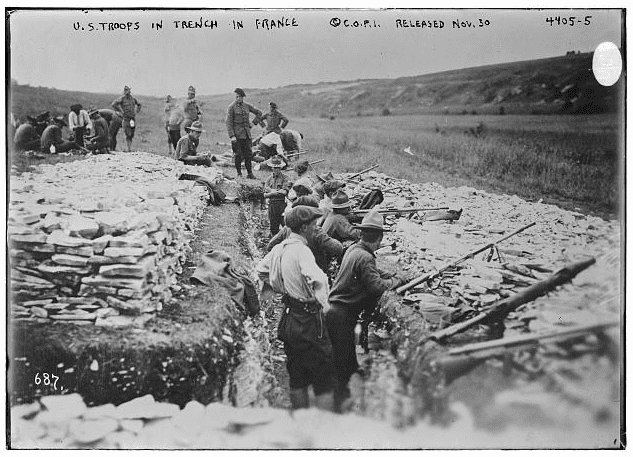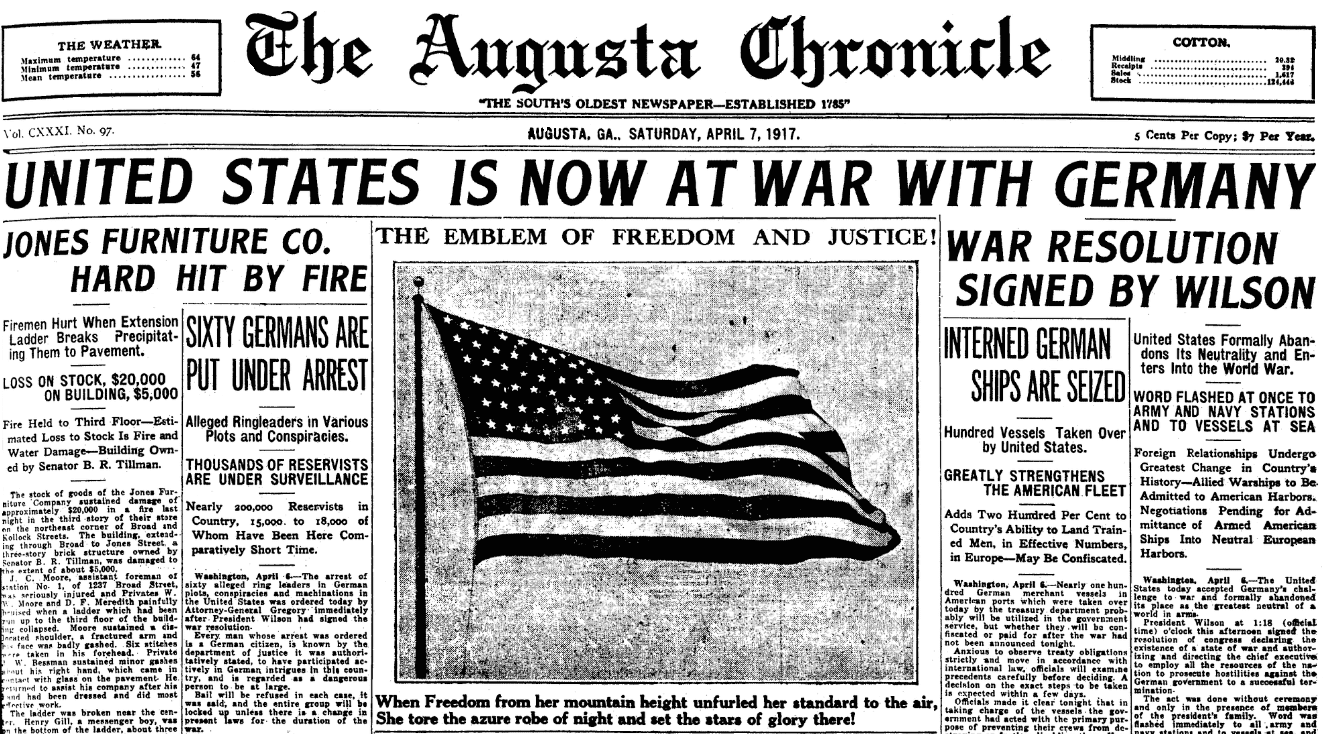President Thomas Woodrow Wilson won reelection in 1916 pledging to keep America out of World War I, which had been raging since 1914. However, Germany’s declaration of unrestricted submarine warfare in January 1917, and the publication of the “Zimmerman telegram” revealing a German plot to have Mexico and Japan declare war on the U.S., changed America’s position.
On 2 April 1917, President Wilson delivered a powerful speech asking Congress to declare that a state of war existed with Germany, a request Congress – and the general public – embraced. American neutrality ended when Congress declared war on Germany on 6 April 1917.

The debate in the House of Representatives over the war resolution was prolonged, passionate, and respectful. Newspaper headlines such as the one below emphasized that Jeannette Pickering Rankin voted against the war resolution. A suffragist and pacifist, she earned the distinction of becoming the first female member of Congress when she was elected to represent Montana in the U.S. House of Representatives on 7 November 1916.
She was not alone in opposing the war, however; 50 representatives voted against America’s entry into the war, the pacifist effort led by House majority leader Representative Claude Kitchin, a Democrat from North Carolina.

Here is a transcription of this article:
UNITED STATES IS NOW AT WAR WITH GERMANY
WAR RESOLUTION SIGNED BY WILSON
United States Formally Abandons Its Neutrality and Enters into the World War
Word Flashed at Once to Army and Navy Stations and to Vessels at Sea
Foreign Relationships Undergo Greatest Change in Country’s History – Allied Warships to Be Admitted to American Harbors. Negotiations Pending for Admittance of Armed American Ships into Neutral European Harbors.
Washington, April 6. – The United States today accepted German’s challenge to war and formally abandoned its place as the greatest neutral of a world in arms.
President Wilson at 1:18 (official time) o’clock this afternoon signed the resolution of Congress declaring the existence of a state of war and authorizing and directing the chief executive to employ all the resources of the nation to prosecute hostilities against the German government to a successful termination.
The act was done without ceremony and only in the presence of members of the president’s family. Word was flashed immediately to all army navy stations and to vessels at sea, and orders for further precautionary steps withheld until the last moment were dispatched.
By proclamation the president announced the state of war, called upon all citizens to manifest their loyalty and assured Germans in this country that they would not be molested as long as they behaved themselves. Orders were issued soon afterward for the arrest of sixty ring leaders in German plots and intrigues.
Mobilization of Navy Ordered
Complete mobilization of the navy, calling all reserves and officers to the colors, was ordered by Secretary Daniels as soon as the war resolution was signed. The War Department, already having taken virtually every step contemplated before raising of a real war army is authorized, waited on Congress. Secretary Baker conferred with Chairman Dent, of the House Military Committee, and arranged to appear before the committee to discuss the general staff army plans and consider the war budget of more than $3,000,000,000.
The president went over all of the great preparatory measures with the cabinet, discussing what has been accomplished and dwelling, it is understood, upon arrangements for cooperation with the Entente allies against the common enemy.
The seizure of German ships laid up in American harbors was the subject of interested comment, and legal officers of the government began consideration of the question of whether the United States can confiscate the ships outright or must pay for them after the war. In any event, as soon as they can be made seaworthy the fine merchant fleet thus acquired will give America a merchant marine that could not be duplicated in several years and add more than 600,000 to the tonnage available for the transportation of supplies and munitions to the allies.
Both houses of Congress have adjourned over until Monday so that their committees may be free tomorrow for preliminary work on war legislation.
Foreign Relationships
Foreign relationships of the United States today underwent the greatest change in the country’s history, sweeping away practically all the international questions of the past two years and substituting entirely new problems. As a result, the State Department is being entirely reorganized and the great mass of routine which has overwhelmed even the highest officials, is to be redistributed along new lines.
The first act of the department when war became a fact was to prepare copies of the war resolution and proclamation for all the foreign missions here for immediate transmission to their governments. Cables were sent to American missions abroad and full mail dispatches prepared to go forward at once. So much of this work had been foreseen that it merely awaited release on word that the president had signed the proclamation.
Instructions prepared several days ago were sent to the Treasury Department to cease transmitting details of the armament and armed guards on merchantmen entering American harbors, on the ground that henceforth no restrictions will be placed on such vessels. Announcement will be made shortly that allied war vessels have been given free admission to American harbors. It is probable, however, that with the seizure of German shipping here and the enlistment of the American Navy in the patrol forces, the Entente will withdraw virtually all war craft from this side of the Atlantic.
Negotiations are now practically completed for the admittance of American armed ships into neutral European harbors. All European neutrals are expected to receive them, except possibly Holland.
Note: An online collection of newspapers, such as GenealogyBank’s Historical Newspaper Archives, is not only a great way to learn about the lives of your ancestors – the old newspaper articles also help you understand American history and the times your ancestors lived in, and the news they talked about and read in their local papers. Did any of your ancestors serve in World War I? Please share your stories with us in the comments section.
Related Articles:
